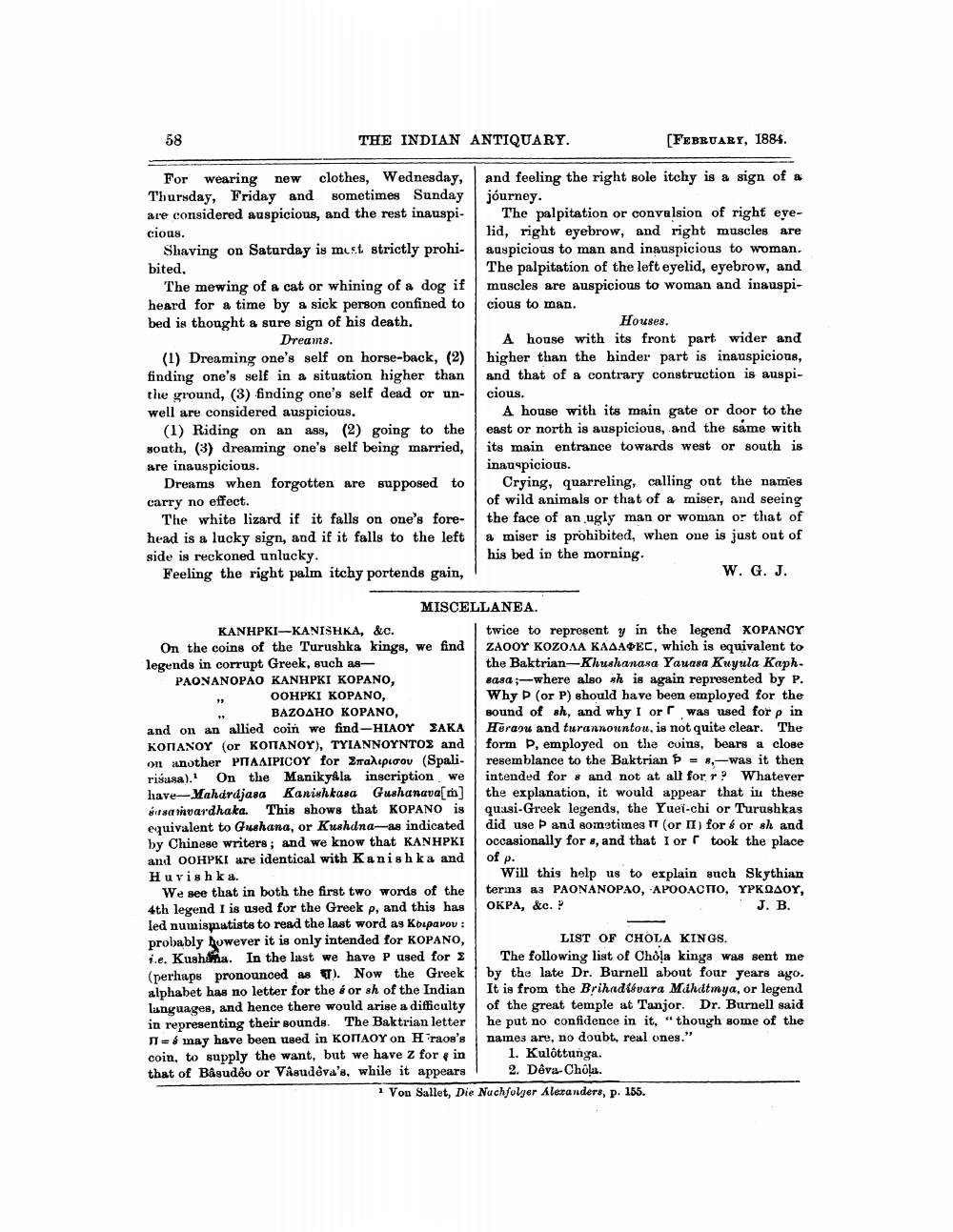________________
58
THE INDIAN ANTIQUARY.
[FEBRUARY, 1884.
For wearing new clothes, Wednesday, Thursday, Friday and sometimes Sunday are considered auspicious, and the rest inauspicious.
Shaving on Saturday is must strictly prohibited.
The mewing of a cat or whining of a dog if heard for a time by a sick person confined to bed is thought a sure sign of his death.
Dreams. (1) Dreaming one's self on horse-back, (2) finding one's self in a situation higher than the ground, (3) finding one's self dead or unwell are considered auspicious.
(1) Riding on an ass, (2) going to the south, (3) dreaming one's self being married, are inauspicions.
Dreams when forgotten are supposed to carry no effect.
The white lizard if it falls on one's fore- head is a lucky sign, and if it falls to the left side is reckoned unlucky.
Feeling the right palm itchy portends gain,
and feeling the right sole itchy is a sign of a journey.
The palpitation or convalsion of right eyelid, right eyebrow, and right muscles are auspicious to man and inauspicious to woman. The palpitation of the left eyelid, eyebrow, and muscles are auspicious to woman and inauspicious to man.
Houses. A house with its front part wider and higher than the hinder part is inauspicious, and that of a contrary construction is auspicious.
A house with its main gate or door to the east or north is auspicious, and the same with its main entrance towards west or south is inauspicious.
Crying, quarreling, calling out the names of wild animals or that of a miser, and seeing the face of an ugly man or woman or that of a miser is prohibited, when one is just out of his bed in the morning.
W. G. J.
MISCELLANEA. KANHPKI-KANISHKA, &c.
twice to represent y in the legend XOPANOY On the coins of the Turushka kings, we find ΖΑΟΟΥ KozΟΛΑ ΚΛΔΑΦΕΕ, which is equivalent to legends in corrupt Greek, such as
the Baktrian-Khushanasa Yauasa Kuyula Kaph. PAONANOPAO KANHPKI KOPANO,
sasa ;-where also sh is again represented by P. OOHPKI KOPANO,
Why P (or P) should have been employed for the BAZOΔHO KOPANO,
sound of sh, and why I orr was used for p in and on an allied coin we find-HIAOY SAKA Horaou and turannountou, is not quite clear. The ΚΟΠΑΝΟΥ (or ΚΟΠΑΝΟΥ), ΤΥΙΑΝΝΟΥΝΤΟΣ and form P, employed on the coins, bears a close on another PITAAIPICOY for maliproov (Spali. resemblance to the Baktrian - -was it then risasa). On the Manikyfla inscription we intended for 8 and not at all for r? Whatever have-Mahardjasa Kanishkasa Gushanava[m] the explanation, it would appear that in these et samvardhaka. This shows that KOPANO is quasi-Greek legends, the Yuei-chi or Turushkas equivalent to Gushana, or Kushdna-as indicated did use and sometimes I (or II) for 6 or sh and by Chinese writers; and we know that KANHPKI occasionally for 8, and that I orr took the place and OOHPKI are identical with Kanishka and of p. Huvishka.
Will this help us to explain such Skythian We see that in both the first two words of the terms as PAONANOPAO, APOOACITO, YPK QAOY, 4th legend I is used for the Greek p, and this has OKPA, &c. P
J. B. led numismatists to read the last word as Kopavou : probably however it is only intended for KOPANO,
LIST OF CHOLA KINGS. i.e. Kushima. In the last we have P used for 2 The following list of Chồla kings was sent me (perhaps pronounced as T). Now the Greek by the late Dr. Burnell about four years ago. alphabet has no letter for the é or sh of the Indian It is from the Brihadisvara Mahatmya, or legend languages, and hence there would arise a difficulty of the great temple at Tanjor. Dr. Burnell said in representing their sounds. The Baktrian letter he put no confidence in it," though some of the J = 6 may have been used in KOITAOY on Hraos's names are, no doubt, real ones." coin, to supply the want, but we have z for in 1. Kulôttunga. that of Basudeo or Vasudeva's, while it appears 2. Dêva-Chula.
1 Von Sallet, Die Nachfolger Aleranders, p. 155.




